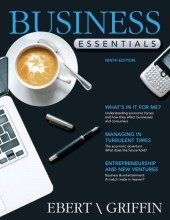Summary: European Union Politics | 9781352009750 | John McCormick
- This + 400k other summaries
- A unique study and practice tool
- Never study anything twice again
- Get the grades you hope for
- 100% sure, 100% understanding
Read the summary and the most important questions on European Union Politics | 9781352009750 | John McCormick
-
5 Building the Community (1958-95)
-
What is the empty chair crisis?
Dispute in 1965 over the relative power of the EEC institutions and the government of the EEC member states, which encouraged France to boycott meetings of the Council of Ministers -
Which factors influenced the empty chair crisis?
- Hallstein was a federalist and was undermined by his inexperience
- Decision making via QMV on issues like agriculture and trade would undermine the use of the national veto. Although decision-making in the EEC was by consensus
- Hallstein suggested that EEC funding should be changed from national contributions to own resources
- Hallstein was a federalist and was undermined by his inexperience
-
What is the Luxembourg Compromise and what was its effect?
A 1966 agreement ending the empty chair crisis,
making consensus the informal norm in Council of Minister decisions.
The effect was slowing down European Integration -
Which Cold War events impacted the relation between the US, SU and Europe
- 1961 building of the Berlin Wall
- 1962: discovery Soviet Nuclear weapons
- show how Europe was unimportant
- US Policy Vietnam
- resistance in Europe
- revealed extent difference in opinion within Atlantic alliance on critical security problems
-
What events showed a thawing East- West-Europe relations?
- Prague Spring (1968) - instuted politial and economic reforms that sparked a soviet invasion in August
-
What was the influence of Willy Brandt's Ostpolitik
Showed what was possible in bringing east and west together. Part of it was acknowledging that the post-war decision was permanent.
Replaced the Cold War with a cold peace -
5.2 Enlargment arrives on the agenda (1960-86)
This is a preview. There are 1 more flashcards available for chapter 5.2
Show more cards here -
What was the goal of the European Free Trade Association (EFTA)
Was a free tradegrouping with the goal ofpromoting free trade. But it had- no
contractual obligations - no political
objectives - only institutions:
- Council of Ministers
- group of permanent representatives
tariffs and promoted trade among members, but several did more trade with theEEC than each other - no
-
Why did de Gaulle vote against British Membership to the EEC
De Gaulle was concerned that Britain would want to redefine the goals of the EEC at the expense of French influence- Regarded Britain as a rival to French influence in the EEC
- a back door for US influence
-
What were the consequences for the 1973-1985 expansion
- Changed the economic balance between the member states. Poor British economy and even poorer Mediterranean states, resulted in a redistribution of EEC spending
- increased the international influence of the EEC
- complicated decision-making process by requiring a wider range of opinions and interests be considered
- Changed the economic balance between the member states. Poor British economy and even poorer Mediterranean states, resulted in a redistribution of EEC spending
-
5.3 Exploring monetary Union (1969-92)
This is a preview. There are 7 more flashcards available for chapter 5.3
Show more cards here -
What steps where taken by the EEC to avoid economic problems
- 1950 European Payments Union -> encourage the convertibility of European currencies by setting realistic exchange rates
- replaced by European Monetary Agreement - EEC members worked to keep exchange rates stable relative to the dollar
- 1965: committee of governors of central banks - coordinate monetary policy
- Higher grades + faster learning
- Never study anything twice
- 100% sure, 100% understanding
































